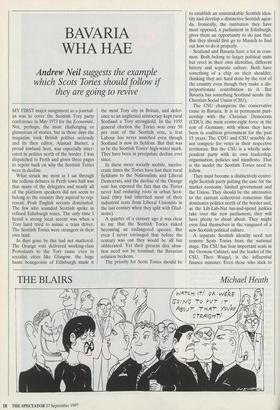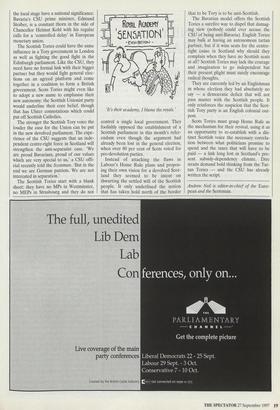BAVARIA WHA HAE
Andrew Neil suggests the example which Scots Tories should follow if they are going to revive MY FIRST major assignment as a journal- ist was to cover the Scottish Tory party conference in May 1973 for the Economist. Not, perhaps, the most challenging or glamorous of stories, but in those days the magazine took British politics seriously and its then editor, Alastair Burnet, a proud lowland Scot, was especially inter- ested in politics north of the border. I was dispatched to Perth and given three pages to report back on why the Scottish Tories were in decline.
What struck me most as I sat through the tedious debates in Perth town hall was that many of the delegates and nearly all of the platform speakers did not seem to belong to the country they aspired to rep- resent. Posh English accents dominated. The few who sounded Scottish spoke in refined Edinburgh tones. The only time I heard a strong local accent was when a Tory laird tried to mimic a train driver. The Scottish Tories were strangers in their own land.
In days gone by this had not mattered. The Orange vote delivered working-class Protestants to the Tory cause even in socialist cities like Glasgow, the huge haute bourgeoisie of Edinburgh made it the most Tory city in Britain, and defer- ence to an anglicised aristocracy kept rural Scotland a Tory stronghold. In the 1955 general election the Tories won over 50 per cent of the Scottish vote, a feat Labour has never matched even though Scotland is now its fiefdom. But that was to be the Scottish Tories' high-water mark. They have been in precipitate decline ever since.
In these more socially mobile, merito- cratic times the Tories have lost their rural fiefdoms to the Nationalists and Liberal Democrats, and the decline of the Orange vote has exposed the fact that the Tories never had enduring roots in urban Scot- land (they had inherited most of their industrial seats from Liberal Unionists in the last century when they split with Glad- stone).
A quarter of a century ago it was clear to me that the Scottish Tories risked becoming an endangered species. But even I never envisaged that before the century was out they would be all but obliterated. Yet their present dire situa- tion need not be terminal; the Bavarian solution beckons.
The priority for Scots Tories should be to establish an unmistakable Scottish iden- tity and develop a distinctive Scottish agen- da. Ironically, the institution they have most opposed, a parliament in Edinburgh, gives them an opportunity to do just that. But they should first go to Munich to find out how to do it properly.
Scotland and Bavaria have a lot in com- mon. Both belong to larger political units but revel in their own identities, different history and separate culture. Both have something of a chip on their shoulder, thinking they are hard done by the rest of the country even though they make a dis- proportionate contribution to it. But Bavaria has something Scotland needs: the Christian Social Union (CSU).
The CSU champions the conservative cause in Bavaria. It is in permanent part- nership with the Christian Democrats (CDU), the main centre-right force in the rest of Germany, with whom they have been in coalition government for the past 15 years. The CDU and CSU sensibly do not compete for votes in their respective territories. But the CSU is a wholly inde- pendent party with its own leadership, organisation, policies and manifesto. That is the model the Scottish Tories need to follow.
They must become a distinctively centre- right Scottish party putting the case for the market economy, limited government and the Union. They should be the alternative to the current collectivist consensus that dominates politics north of the border and, as the Lib-Lab-Nat tax-and-spend junkies take over the new parliament, they will have plenty to shout about. They might even find themselves in the vanguard of a new Scottish political culture.
A separate Scottish identity need not remove Scots Tories from the national stage. The CSU has four important seats in the German Cabinet, and the leader of the CSU, Theo Waigel, is the influential finance minister. Even those who stick to the local stage have a national significance: Bavaria's CSU prime minister, Edmund Stoiber, is a constant thorn in the side of Chancellor Helmut Kohl with his regular calls for a 'controlled delay' in European monetary union.
The Scottish Tories could have the same influence in a Tory government in London as well as fighting the good fight in the Edinburgh parliament. Like the CSU, they need have no formal link with their bigger partner but they would fight general elec- tions on an agreed platform and come together in a coalition to form a British government. Scots Tories might even like to adopt a new name to emphasise their new autonomy: the Scottish Unionist party would underline their core belief, though that has Ulster connotations which could put off Scottish Catholics.
The stronger the Scottish Tory voice the louder the case for the Union can be put in the new devolved parliament. The expe- rience of the CSU suggests that an inde- pendent centre-right force in Scotland will strengthen the anti-separatist case. 'We are proud Bavarians, proud of our values which are very special to us,' a CSU offi- cial recently told the Scotsman. 'But in the end we are German patriots. We are not interested in separation.'
The Scottish Tories start with a blank sheet: they have no MPs in Westminster, no MEPs in Strasbourg and they do not It's their academy, I blame the royals.'
control a single local government. They foolishly opposed the establishment of a Scottish parliament in this month's refer- endum even though the argument had already been lost in the general election, when over 80 per cent of Scots voted for pro-devolution parties.
Instead of attacking the flaws in Labour's Home Rule plans and propos- ing their own vision for a devolved Scot- land they seemed to be intent on thwarting the settled will of the Scottish people. It only underlined the notion that has taken hold north of the border that to be Tory is to be anti-Scottish.
The Bavarian model offers the Scottish Tories a surefire way to dispel that damag- ing view (nobody could ever accuse the CSU of being anti-Bavaria). English Tories may balk at having an autonomous tartan partner, but if it wins seats for the centre- right cause in Scotland why should they complain when they have no Scottish seats at all? Scottish Tories may lack the courage and imagination to go independent but their present plight must surely encourage radical thoughts.
They are currently led by an Englishman in whose election they had absolutely no say — a democratic deficit that will not pass muster with the Scottish people. It only reinforces the suspicion that the Scot- tish Tory party is an English colonial out- post.
Scots Tories must grasp Home Rule as the mechanism for their revival, using it as an opportunity to re-establish with a dis- tinct Scottish voice the necessary correla- tion between what politicians promise to spend and the taxes that will have to be paid — a link long lost in Scotland's pre- sent subsidy-dependency climate. Dire straits demand bold thinking from the Tar- tan Tories — and the CSU has already written the script.
Andrew Neil is editor-in-chief of the Euro- pean and the Scotsman.











































































 Previous page
Previous page